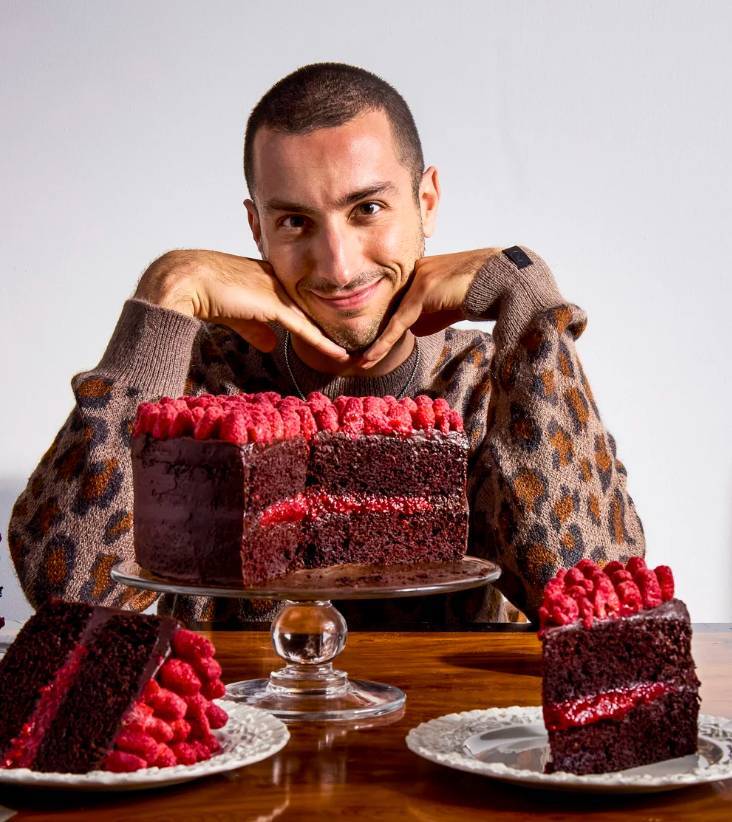 Jake Cohen is a chef, author and social media personality from New York. (Photo by Matt Taylor-Gross)
Jake Cohen is a chef, author and social media personality from New York. (Photo by Matt Taylor-Gross)
For Jake Cohen, cooking was always the plan.
The Jewish chef has over 2.5 million social media followers and has authored two books that are New York Times best-sellers, but his journey into the food industry started in the kitchens of Manhattan, where he worked in a handful of restaurants before launching his own endeavor.
“I worked at some really incredible restaurants, but I always knew that I didn’t want to be in a restaurant kitchen,” Cohen said. “So, I switched over to magazines, and then bopped around as we got eclipsed by digital and then social, while at the same time paying attention to what I really wanted to do, which was my own thing. The second I could get my own book deal, I did, and now we’re at number three, and very grateful to be able to do what I Iove.”
On Sept. 29, Cohen will venture to the Weitzman National Museum of American Jewish History to celebrate and present the release of book “number three,” titled “Dinner Party Animal.” The event will feature Philadelphia restaurateur and chef Michael Solomonov, comedian Alex Edelman and composer Benj Pasek.
The event will include a conversation, a Q&A moderated by Solomonov and a book signing and nosh. For Cohen, a New Yorker, coming down to Philadelphia is a treat.
“I’m always excited to come to the Weitzman. This is probably my favorite book I’ve done — and I keep saying that every time I write one — but this one’s so rooted in community. I had, in addition to old dinner party menus, grocery lists, timelines and really incredible recipes and vibes for any occasion,” Cohen said.
He added that this book is special because it isn’t just focused on food. It’s focused on community.
“One thing I really wanted to do was showcase people. I am very adamant that I need pictures of every recipe in the book, because people need to see what they’re cooking, especially as a tool for learning, but I also wanted to have pictures of people I love, and so I ended up having portraits taken,” Cohen said. “I had all my friends and family come and taste the recipes, and now I have these huge collages of portraits in the book.”
The list of people pictured in “Dinner Party Animal” is varied, from actress Debra Messing to music producer Benny Blanco to Cohen’s own grandmother.
For Cohen, food is a family affair. He described his upbringing as similar to a “Fran Drescher in the ‘Nanny’-type household.” That fun and colorful childhood informs much of what he does today.
“It’s very much a huge part of what I do now — there’s a lot of humor, there’s a lot of familial ties, and there’s a lot of emphasis on community building,” he said.
It’s important to Cohen to maintain this authenticity. There are a lot of food influencers, and he wants to make sure that he is contributing something substantive to the ecosystem.
“It really comes back to the whole [idea] of what someone’s voice is within any type of industry. When I think of what I’m doing, I have this medium of food, and I think the most important thing is that I have a clear perspective — you’re either adding to the conversation or you’re adding to the noise.”
Part of Cohen’s message is that Jewish cooking doesn’t fit into a box. Like the Jewish people, the food that we eat is varied and often melds cultures. He referenced a well-known dessert in Asia as an example. Jalebi is a fried dough soaked in a syrup flavored with saffron and sometimes cardamom or rose water. People associate it with India, and while it is popular there, that doesn’t tell the whole story.
“Actually, it is one of the most famous Chanukah treats for Iraqi Jews and Persian Jews. We think of it in [terms of] modern culture as an Indian dessert, but really it’s a dessert that comes from when the Persian Empire spanned India, Iran and Iraq. It’s an item that’s cross-cultural,” Cohen said. “We love to describe things now with currently drawn borders when that’s really not applicable.”
Cohen said that food is a great way to illustrate how, over the course of time, cultures have overlapped, shared ideas and recipes and worked in the spirit of collaboration.
“For a lot of people, they see it as, ‘Oh, you’re stealing an Indian recipe,’ and it’s just so much deeper than that. I love all the nuanced ways that food comes with history, and it’s just very messy,” he said. “It’s especially true in the Middle East when we think of all these dishes that really just have different tweaks and changes throughout the Levant, but at their core have all these values of when a community was shared.”
Later this month, Cohen will share his message with an audience in Philadelphia, and he hopes that they come hungry and leave satisfied.
“It’s creating, truly, what I think is one of the most important aspects of the human experience — which is connection — and food is the ultimate vessel to do so,” he said.
“What I want to do is help people feel confident so that they can do it more often and find the same joy that I find out of it.”